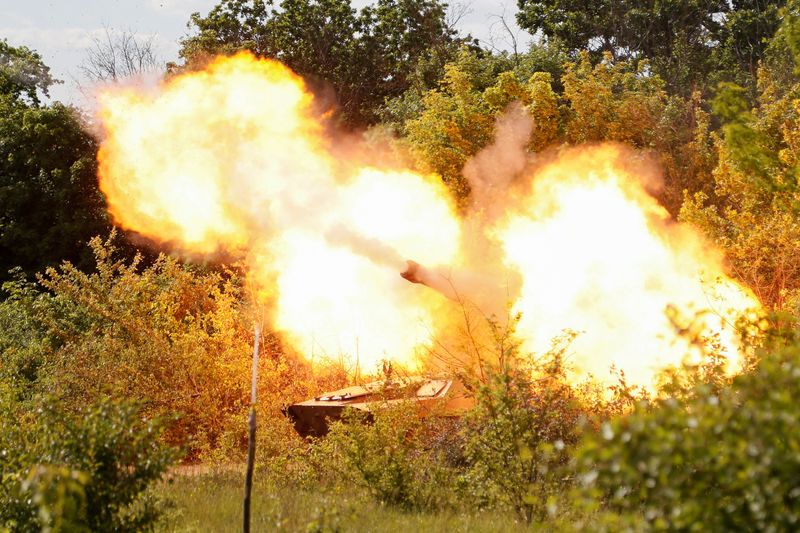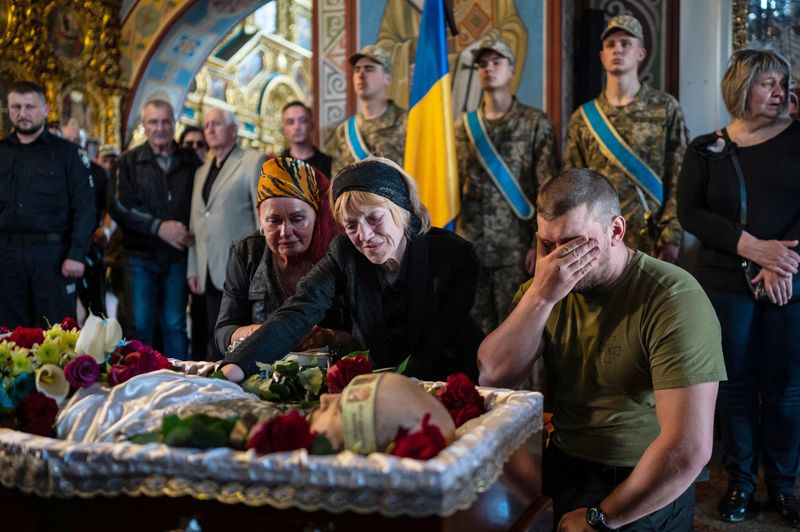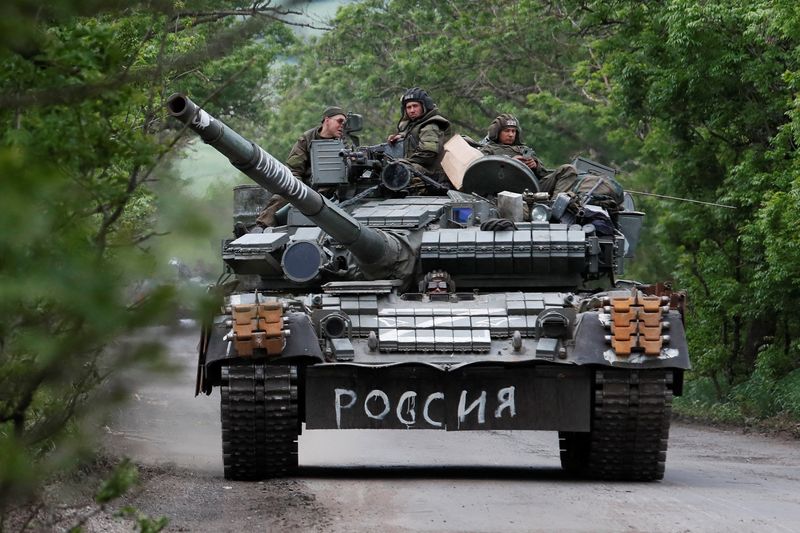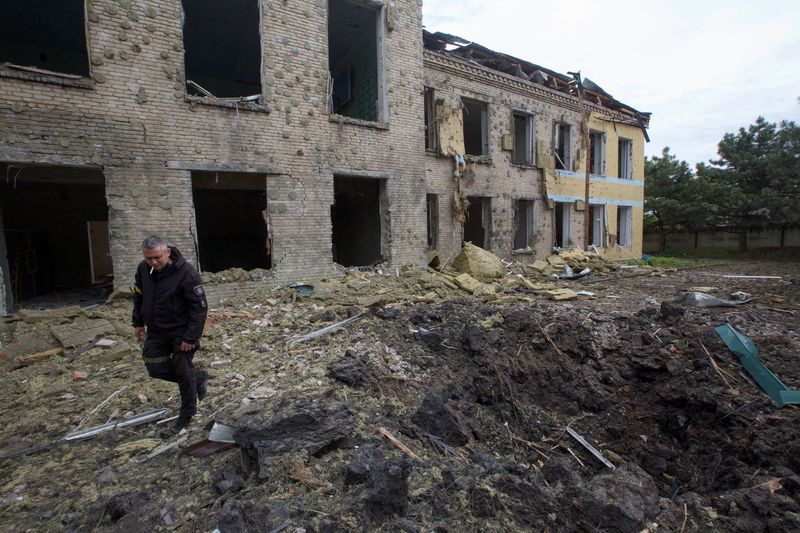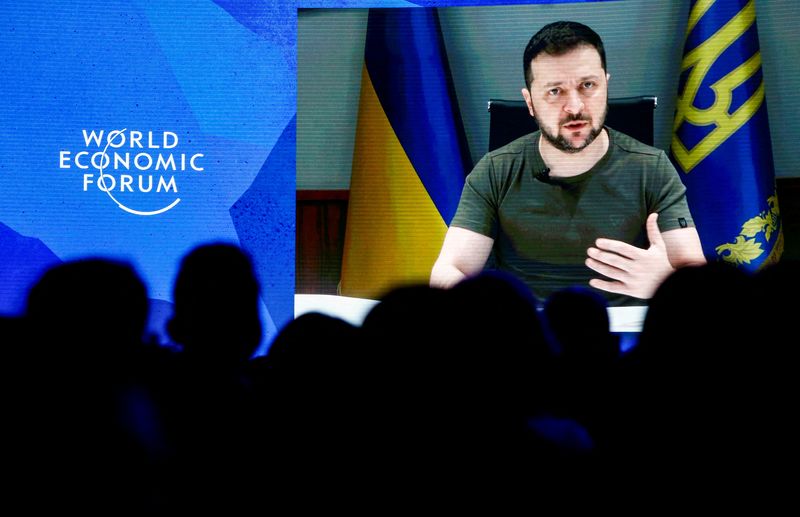By Pavel Polityuk and Max Hunder
KYIV/KRAMATORSK, Ukraine – Russian forces on Wednesday pounded Ukrainian-held twin cities in the Donbas region that is now the focus of the three-month war, threatening to shut off the last main escape route for civilians trapped in the path of their advance.
After failing to seize Ukraine’s capital Kyiv or its second city Kharkiv, Russia is trying to take full control of the Donbas, comprised of two eastern provinces Moscow claims on behalf of separatists.
Russia has poured thousands of troops into the region, attacking from three sides in an attempt to encircle Ukrainian forces holding out in the city of Sievierodonetsk and its twin Lysychansk. Their fall would leave the whole of Luhansk province under Russian control, a key Kremlin war aim.
Police in Lysychansk are collecting bodies of people killed in order to bury them in mass graves, Luhansk regional governor Serhiy Gaidai said. Some 150 people have been buried in a mass grave in one Lysychansk district, he added.
Oleksiy Arestovych, an adviser to Ukraine’s president, said Russia’s “army is having some tactical success which is threatening to become an operational success in the direction of Lysychansk and Sievierodonetsk.”
Sievierodonetsk and Bakhmut, a town to the southeast, were in danger of being encircled, Arestovych said. “(It’s) possible that settlements will be abandoned, it’s possible we will have heavy losses.”
Families of people buried in mass graves will be able to carry out a reburial after the war, and police are issuing documents enabling Ukrainians to secure death certificates for loved ones, Gaidai said.
The main road out of Sievierodonetsk was being shelled, but humanitarian aid was still getting in, Gaidai said in an earlier statement. Ukraine President Volodymyr Zelenskiy said Russian troops “heavily outnumber us” in some parts of the east.
Reuters was unable to independently confirm the battlefield reports.
As Moscow seeks to solidify its grip on the territory it has seized, President Vladimir Putin signed a decree simplifying the process for residents of newly captured districts to acquire Russian citizenship and passports.
SHELLING
A missile blasted a crater in a railway track and damaged nearby buildings in Pokrovsk, a Ukrainian-held Donbas city that has become a major hub for supplies and evacuations.
In Kramatorsk, nearer the front line, streets were largely deserted, while in Sloviansk further west, many residents took advantage of what Ukraine said was a break in the Russian assault to leave.
“My house was bombed, I have nothing,” said Vera Safronova, seated in a train carriage among the evacuees.
Further north, two people were killed and seven wounded by Russian artillery shelling of the town of Balakliya in the Kharkiv region, an aide to its governor said on Facebook.
Russia is also targeting southern Ukraine, where officials said shelling had killed a civilian and damaged scores of houses in Zaporozhzhia and missiles had destroyed an industrial facility in Kryviy Rih.
Moscow has blockaded ships from southern Ukraine that would normally export Ukrainian grain and sunflower oil through the Black Sea, pushing up prices globally. The African Union urged the two countries on Wednesday to unblock exports of grains and fertiliser to avoid widespread famine.
Russia has blamed Western sanctions for the food crisis. It said on Wednesday it was ready to provide a humanitarian corridor for vessels carrying food to leave Ukraine but wanted sanctions to be lifted in return.
Ukraine’s Foreign Minister Dmytro Kuleba accused Moscow of using “blackmail” tactics to secure a relaxation of sanctions.
A senior United Nations official is due to visit Moscow in the coming days to discuss reviving fertiliser exports.
ECONOMIC SQUEEZE
With its invasion now into its fourth month, Russia still has only limited gains to show for its worst military losses in decades, while much of Ukraine has suffered devastation as Moscow steps up strikes to offset its slow progress.
The Russian parliament scrapped the upper age limit for contractual service in the military on Wednesday, highlighting the need to replace lost troops.
In a late night video address, Zelenskiy, commenting on the new Russian enlistment rules, said: “(They) no longer have enough young men, but they still have the will to fight. It will still take time to crush this will.”
Western nations have imposed severe sanctions on Russia.
The United States pushed Russia closer to the brink of a historic debt default on Wednesday by not extending its licence to pay bondholders. That waiver has allowed Moscow to keep up government debt payments till now.
The European Commission proposed on Wednesday to make breaking EU sanctions against Russia a crime.
The EU also said it hoped to agree sanctions on Russian oil before the next meeting of EU leaders.
But Russia, for now at least, is not short of money. Oil and gas revenues stood at $28 billion in April alone thanks to high energy prices.
Putin on Wednesday ordered the government to hike old-age pensions and the minimum wage by 10%, while stating that not all economic problems were linked to what he calls Russia’s “special military operation” in Ukraine.
Zelenskiy said this week the conflict could only be ended with direct talks between him and Putin, but Ukraine’s closest allies say they fear some Western nations might push Kyiv to give up land for peace.
Italy and Hungary want the EU to call explicitly at a leaders’ summit next week for a ceasefire in Ukraine and peace talks with Russia, diplomats say.
Estonia’s prime minister, Kaja Kallas, said Ukraine should not be forced into accepting a bad deal.
“It is much more dangerous giving in to Putin than provoking him,” she said. “All these seemingly small concessions to the aggressor lead to big wars. We have made this mistake already three times: Georgia, Crimea and Donbas.”
(Reporting by Oleksandr Kozhukhar in Lviv, Pavel Polityuk, Natalia Zinets and Conor Humphries in Kyiv, Vitaliy Hnidiy in Kharkiv and Reuters journalists in Mariupol and Slovyansk; Writing by Philippa Fletcher, Gareth Jones and Rami Ayyub; Editing by Peter Graff, Tomasz Janowski and Rosalba O’Brien)

